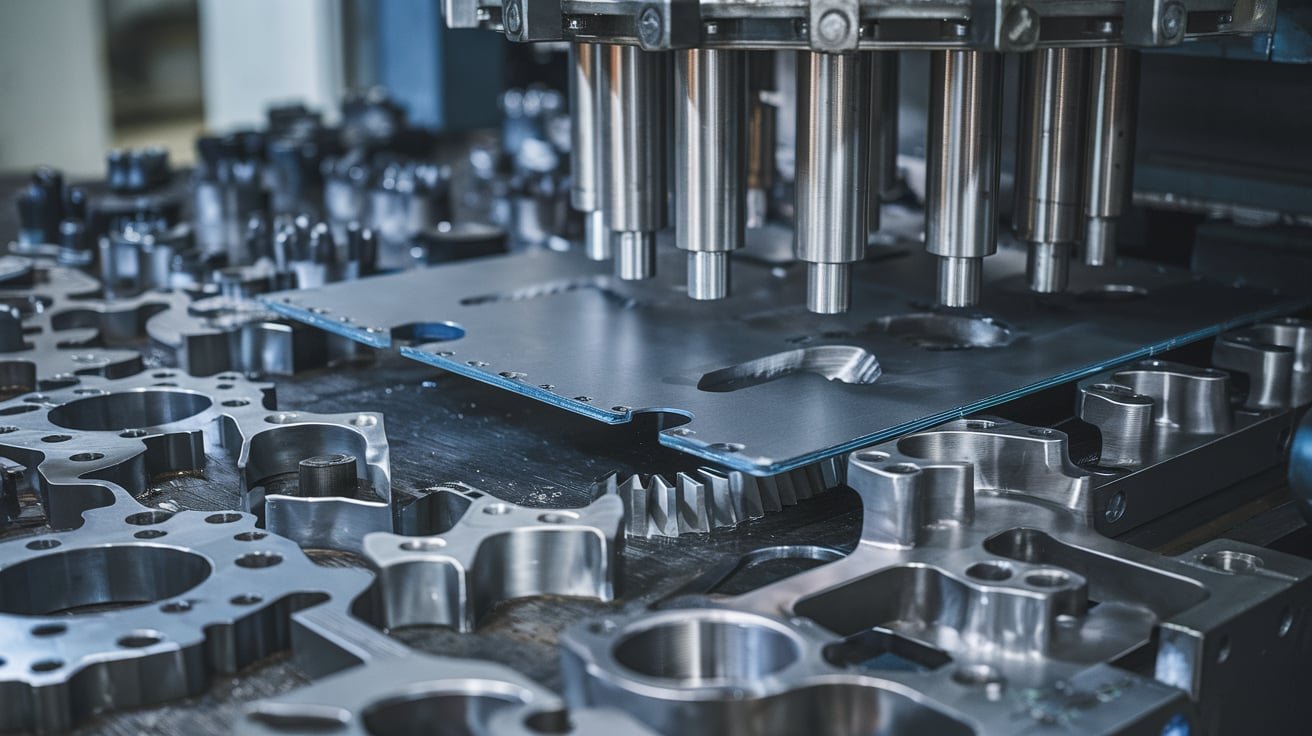The automotive industry is driven by innovation, precision, and efficiency. Manufacturers constantly seek ways to improve production processes and enhance vehicle quality while maintaining cost-effectiveness. Custom progressive die stamping is a crucial method that ensures these goals in vehicle production. This manufacturing technique allows for the creation of complex components with remarkable accuracy, supporting the rapid evolution of automotive technology.
But how does this advanced process transform raw materials into high-quality auto parts? Custom progressive stamping involves steps where sheet metal passes through multiple stations, each performing a specific operation such as cutting or forming.Automotive metal stamping plays a pivotal role in ensuring that every component is durable and designed to exact specifications, ultimately contributing to modern vehicles’ overall safety and performance.
The Basics of Custom Progressive Stamping
It is a metal-forming process that involves shaping sheet metal into specific parts. Each station performs a different task, cutting, bending, or punching until the final part is produced. This process allows manufacturers to create exact and complex components for the automotive sector.
In the car manufacturing industry, the need for accuracy and speed is paramount. Custom progressive stamping meets these demands by allowing the creation of intricate parts with minimal waste. This method not only enhances production efficiency but also ensures that the parts meet strict industry standards.
The Role of Custom Stamping in Automotive Parts
In the automotive world, parts must adhere to exact specifications for safety, performance, and reliability. It allows manufacturers to meet these requirements by providing consistent results. Here’s how the process contributes to automotive component production:
- Precision: Automotive parts often require detailed and intricate shapes, which are difficult to achieve with basic methods. It can handle complex designs with minimal variation, ensuring each part fits perfectly in the final assembly.
- Efficiency: The ability to produce large parts quickly and with high precision helps manufacturers meet demand without compromising quality. This efficiency also reduces production costs, making vehicles more affordable for consumers.
- Versatility: It can produce various automotive components, from small brackets to large body panels. This versatility allows manufacturers to rely on one process for multiple parts, streamlining production.
Applications of Custom Stamping in Automotive Manufacturing
The automotive industry is vast, and custom progressive stamping plays a role in numerous areas of vehicle production. The absolute most normal applications include:
- Structural Components: It is essential for creating the frame and body panels of a vehicle. These components must be both lightweight and robust to ensure the vehicle’s performance and safety.
- Engine and Transmission Parts: Precision is crucial when manufacturing engine and transmission components. It allows for producing these parts with exact tolerances, ensuring the engine and transmission work efficiently.
- Braking Systems: Safety-critical parts, such as brake components, require high levels of accuracy. It ensures that these parts are manufactured to precise specifications to meet safety standards.
- Interior and Exterior Trim: In addition to the functional parts, it is also used to create interior and exterior trim pieces. These components must fit perfectly with the vehicle’s overall design, and custom stamping ensures a seamless finish.
Scope of Custom Stamping in Automotive Design
Looking ahead, the role of custom progressive stamping will expand as the automotive industry continues to innovate. The following trends are shaping this manufacturing process:
Increased Use of Lightweight Materials
As automotive manufacturers focus on reducing vehicle weight for fuel efficiency and performance, lightweight materials, such as aluminum and composites, play a crucial role in forming complex shapes.
Integration with Automation
Automation transforms manufacturing across industries, and custom stamping is no exception. As automation becomes more integrated into the production line, manufacturers can expect increased accuracy, faster production times, and reduced labor costs.
Sustainability in Manufacturing
Through metal stamping, the automotive industry is reducing its environmental footprint. Its ability to minimize material waste makes it an environmentally friendly option, contributing to more sustainable manufacturing practices.
Electric and Autonomous Vehicle Components
As electric and autonomous vehicles become more prevalent, manufacturers must produce highly specialized parts. Custom stamping enables the production of these components with the necessary precision and efficiency to support the next generation of vehicles.
Custom progressive die stamping has revolutionized the automotive industry by offering a precise, efficient, cost-effective method for producing essential components. From structural parts to intricate engine components, the process ensures that every piece of a vehicle meets high standards of quality and reliability. Automotive metal stamping is crucial in achieving the accuracy and consistency needed to manufacture these complex parts. As the automotive sector continues to advance with innovations, the role of custom stamping remains invaluable in the car manufacturing industry.
